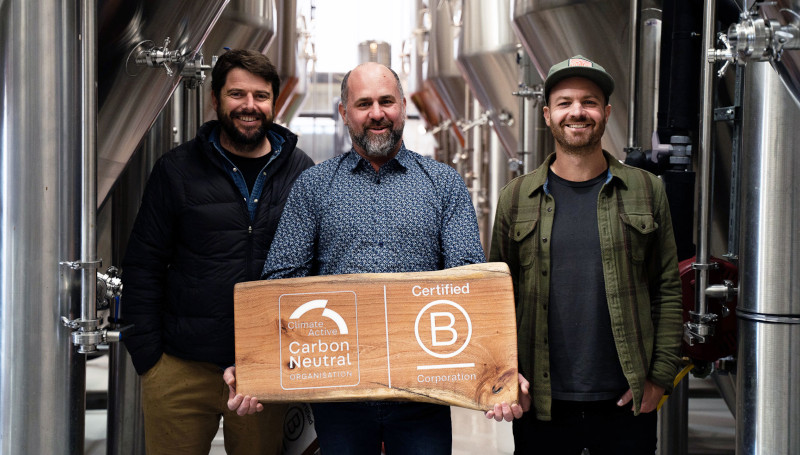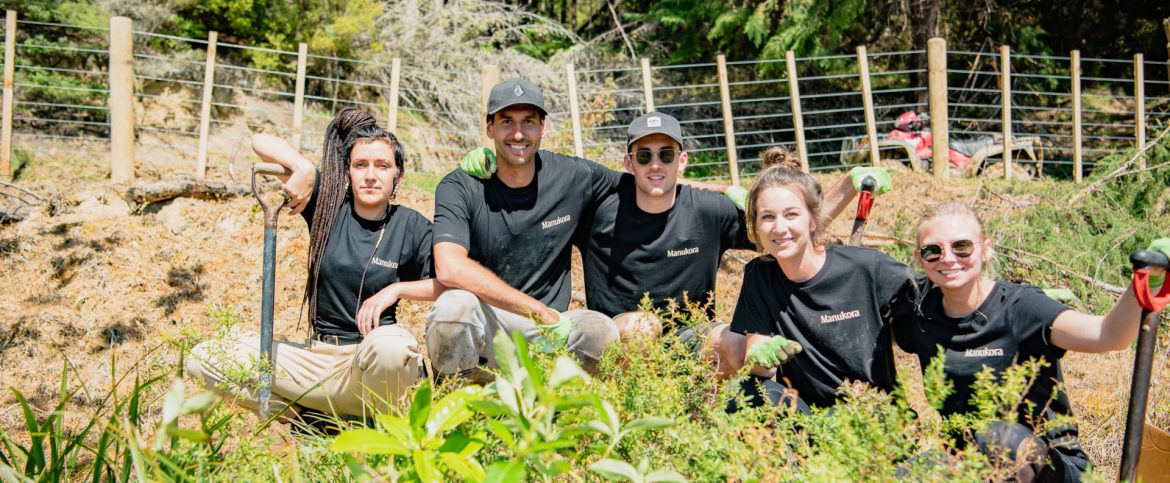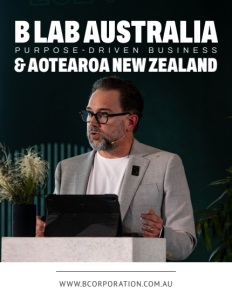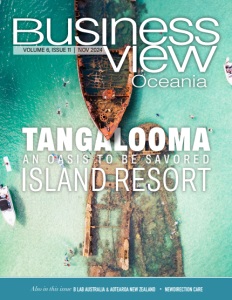B Lab Australia and Aotearoa New Zealand
Purpose-Driven Business
Promoting ethical and sustainable business practices through an inclusive economic system
In the fast-paced, often profit-driven world of modern business, it’s easy to assume that ethics and sustainability take a backseat. However, for Andrew Davies, CEO of B Lab Australia and Aotearoa New Zealand, ethical, sustainable and profitable business is achievable and essential for the long-term future of both business and society. At the heart of his mission is a drive to “fix capitalism” by promoting a regenerative, inclusive economic system where companies are held accountable for their social and environmental impact. Davies believes this concept is key to transforming how businesses operate on a fundamental level.
Commitment to systemic change
B Lab operates as a global network, with each regional branch working toward the organization’s unified mission: to create an equitable and regenerative economy. Davies explains, ” Our work rests on the idea of systems change, and our levers include firstly changing the behaviour of business directly with our impact tools and B Corp Certification. Then we focus on cultural change as a lever: the norms and mental models of what is expected of business do much to determine how our system works. Lastly we look at structural change: the rules and regulations that govern business.” Through the B Corp certification, B Lab encourages companies to move beyond profit as their sole driver and, instead, to prioritize positive impact on people and the planet.
Davies emphasizes that B Corp is more than a label—it’s a rigorous certification requiring businesses to analyze their practices deeply across multiple areas. “It’s a business certification for ethical and sustainable business performance,” he explains, “and we’re known for having some of the highest social and environmental performance standards.” This commitment to high standards is central to B Lab’s philosophy, with certified businesses as examples of what Davies hopes will become the new norm in business practice.

Corporate responsibility in action
The last few years have seen a surge in interest from businesses eager to become Certified B Corporations, even during the pandemic—a period that could have seen companies shy away from extra initiatives. Surprisingly, Davies says, “The opposite happened. We were overwhelmed by demand through the pandemic period,” attributing this increase to a rising global awareness of corporate responsibility. “Businesses increasingly recognize their role in driving change, whether addressing climate change, social inequality, or other pressing issues.” The pandemic, he notes, highlighted the need for accountable and sustainable business practices, spurring companies to seek frameworks like B Corp certification to improve their performance.
Over the past five years, the B Corp community in Australia has grown exponentially. There are now approximately 750 B Corps in the region, representing around $22 billion in revenue and employing some 45,000 people—a significant economic footprint that underscores the movement’s relevance and growing impact.
B Corp certification
B Corp certification is a comprehensive process structured around three main requirements: performance, transparency, and legal accountability. According to Davies, the certification assesses five key areas: customer impact, community engagement, governance, employment practices, and environmental footprint. To achieve certification, companies must reach a benchmark score of 80 points. “Most businesses on their first try might land somewhere in the fifties,” says Davies, highlighting that many must rethink and redesign aspects of their business to meet B Corp’s rigorous standards.
The commitment to transparency requires companies to disclose their performance in a global directory accessible to anyone. Davies states, “This public accountability is key for ensuring that companies remain committed to their impact goals.”
Finally, the legal requirement mandates that companies embed a purpose-driven mission into their organizational DNA. “It’s not enough to simply declare that you care about stakeholders; it must be formalized in a company’s constitution or shareholder agreements,” says Davies. This commitment to stakeholder governance is fundamental in ensuring businesses remain true to their ethical mission, even as they navigate challenges and growth.
Ongoing accountability and community support
B Corp certification isn’t a one-time achievement; companies must recertify every three years. Davies explains that the process is as thorough the second time around as it was initially. “We assess documents, visit larger companies, and even talk to employees or suppliers. The goal is to ensure that these companies are meeting standards and continuously improving.”
Beyond the certification, Davies underscores the power of the B Corp community. “We don’t just certify them and leave them to their own devices,” he says. B Lab organizes events and programs where B Corps can collaborate on issues they collectively care about, from climate change to sustainable packaging. This sense of community encourages companies to “work together to solve problems and drive change,” fostering a network of ethical businesses committed to collective impact.

Stories of success
One of the movement’s shining success stories is KeepCup, a company at the forefront of developing reusable coffee cups. “They targeted cafes to stop single-use, disposable coffee cups,” Davies notes. KeepCup’s success has since inspired other businesses in Australia and beyond to adopt similar solutions. “It’s now common to bring your cup for takeaway coffee in our part of the world,” he adds, underscoring how individual businesses can drive systemic change.
Another notable example is R.M. Williams, the iconic Australian bootmaker. As a heritage brand with nearly 150 years of history, R.M. Williams recently achieved B Corp certification, marking a significant commitment to sustainability and social responsibility. “Brands recognize that they can no longer rely just on product-based claims around quality” says Davies. “They also need to have a credible conversation about sustainability.” By certifying as a B Corp, R.M. Williams demonstrated that established companies with long histories are evolving to meet modern standards of corporate responsibility and sustainability.
Working with governments
B Lab’s collaboration extends beyond businesses to governments and other certification bodies, especially as regulatory expectations around climate and social impact continue to evolve. “We have to ensure that B Corp standards are interoperable with other certifications,” says Davies, pointing out the importance of avoiding redundancies in certification requirements. By harmonizing standards with other organizations, B Lab makes it easier for businesses to focus on improving performance rather than simply meeting compliance.
Furthermore, Davies believes collaboration is essential in changing the dominant narratives surrounding business. “For decades, we’ve been told that the role of business is to make money for shareholders,” he says, referencing the famous Friedman Doctrine that shaped corporate philosophy for much of the 20th century. “But that truth is outdated and doesn’t reflect our current economic and environmental realities.” He advocates for an alternative approach, where businesses operate profitably while addressing societal challenges like poverty, inequality, and climate change.
Overcoming regulatory and cost challenges
Changing the way businesses operate is not without challenges. One significant obstacle is the enduring narrative that companies need “freedom” from regulations to thrive. Davies counters this by pointing out that regulatory measures like climate disclosure are becoming the norm, pushing companies to be more transparent. He also acknowledges that some sustainable choices may be more expensive in the short term, requiring leaders with “moral courage” to prioritize long-term impact over short-term gains.
Davies emphasizes the need for leadership that goes beyond traditional business skills. “We need business leaders who can exhibit moral courage and tackle the complex challenges of the modern economy.” This type of leadership, he explains, is necessary to guide both small and large businesses toward sustainable practices. The ultimate goal is to ensure companies aren’t just focused on profit but also contribute positively to society.
Conscious consumerism
Despite the challenges, Davies remains optimistic about the future. “We’re already seeing conscious consumerism on the rise,” he says, “with people demanding more from the businesses they support.” He highlights the growing expectation for transparency, especially in packaging, where consumers ask about recyclability and environmental impact.
Davies believes that the capitalist system can be a powerful tool for change when tweaked to reward ethical and sustainable practices. “If we can show that ethical, sustainable, and profitable business is effective, that’s the kind of innovation we want to see.” He’s confident that the system will continue to evolve with the right balance of regulation and consumer demand.
An invitation to change
For companies considering B Corp certification, Davies has a simple message: “Give it a go.” The B Impact Assessment, the primary tool used to measure and improve business impact, is accessible to any company whether they decide to pursue certification. He believes this democratizes access to better business practices and allows companies to assess themselves against high standards, potentially setting them on a path toward certification.
Davies says that the community of B Corps is a testament to the possibility of creating impactful, responsible businesses across various industries and scales. From sole proprietorships to multinational corporations, companies of all types have successfully pursued B Corp certification, challenging the traditional notion that profit and purpose are at odds. “Once you start to see the B Corp symbol,” he notes, “you’ll start noticing it everywhere.”
Leading with purpose
For Davies, leading B Lab Australia and Aotearoa New Zealand is deeply fulfilling. Reflecting on his journey—from corporate law to running a family business to his current role—he sees his varied experiences as crucial to understanding the different needs and challenges of companies seeking certification. “I’m surrounded by people who inspire me every day,” he says, “and I feel fortunate to work alongside businesses that are actively making the world a better place.”
In a world facing unprecedented environmental and social challenges, B Lab offers a model for businesses that aim to do better for their shareholders and society. Through certification, community collaboration, and a faithful commitment to accountability, B Corp is leading the charge in redefining what it means to be a successful business. “If we can redefine business as a force for good,” says Davies, “we can build an economy that truly serves people and the planet.”
AT A GLANCE
B Lab Australia and Aotearoa New Zealand
What: A global nonprofit organization certifying companies as B Corporations based on rigorous social and environmental performance standards, accountability, and transparency.
Where: Australia and Aotearoa, New Zealand
Website: https://bcorporation.com.au/




 This information will never be shared to third parties
This information will never be shared to third parties